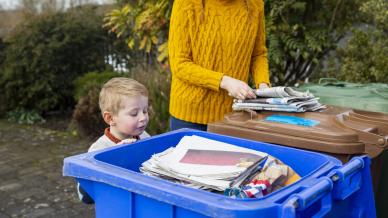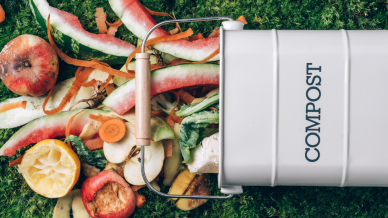Zero Waste Week is an annual, international campaign aimed at reducing landfill waste and promoting recycling and sustainability. It takes place annually during the first full week of Sept. This year, it will be held from 2nd-6th Sept 2024. The campaign encourages individuals, businesses, schools, and community groups to act in reducing waste, preserving resources, and protecting the environment. Participants are encouraged to set goals, act, and celebrate their successes in reducing waste.
What is Zero Waste?
Zero waste is a philosophy, and a set of principles which focuses on waste prevention and helping towards the overall goal of reaching net zero. Want to know more about net zero? Click here to read our explainer.
The aim of zero waste is to redesign all resource life cycles, so they are circular and not linear. This ensures that all products are reused.
What are the 5Rs of sustainable living?
I am sure if you are reading this you already have an interest in sustainability and are practicing the 5Rs of sustainable living as a way of life. If not, they are.
1) Refuse
Avoid using unnecessary items.
2) Reduce
Minimize the amount of waste produced.
3) Reuse
Use items multiple times.
4) Recycle
Process materials to make new products.
5) Rot
Compost organic waste.

What are the 10Rs or sustainable living?
They are something you may wish to consider as a basic way to live and help tackle environmental issues at home and abroad. However, there is still a huge amount of waste, increased carbon emissions, the prevalent pollution of water, air, soil, and climate change, thanks to global warming. Are just the 5Rs good enough to help tackle this?
There is a thought that there is a lot more to being considerate towards the environment than just the 5Rs. They are a foot in the front door in helping to deal with climate change and its associated issues. However, there is a need to rethink how we go about dealing with these changes. This includes a different mindset, attitude and pro-active behaviour which can be applied locally, globally, at work, at home, or at play/leisure.
To be agents of change, you may wish to extend the 5Rs and consider adopting the 10Rs for sustainability. They remind us of the requirements for a more environmentally conscious lifestyle and reflect on our actions, helping us undergo meaningful individual environmental decision making. The 10Rs offer a more comprehensive approach to sustainability compared to the traditional 5Rs. You may wish to consider embracing the 10Rs of sustainability. They are as follows:
1) Reduce
The original 5Rs emphasise reducing waste, which is crucial. However, the 10Rs go beyond waste reduction. They encourage minimising resource use from the very beginning by designing products that require fewer raw materials.
2) Reuse
Reusing items is essential, but the 10Rs also consider innovative business models like sharing and repairing. These models extend the lifespan of products, reducing the need for constant replacements.
3) Recycle
Recycling is valuable, but it is not the sole solution. The 10Rs recognise that recycling alone will not address all sustainability challenges. We must focus on upstream changes, such as better product design and collection infrastructure.
4) Refuse
Saying no to unnecessary items is a powerful step. By refusing what we do not truly need, we prevent waste generation altogether.
5) Repair
Repairing products instead of discarding them promotes longevity. It is a sustainable practice that aligns with circular economy principles.
6) Repurpose
Repurposing items creatively gives them new life. It is about finding alternative uses beyond their original purpose.
7) Rethink
The 10Rs encourage critical thinking. We should question existing systems, habits, and consumption patterns to drive positive change.
8) Respect
Respect for resources means valuing them and using them wisely. It is about recognising the finite nature of our planet’s resources.
9) Recover
Resource recovery involves efficient waste management and shifting away from landfill and incineration. It is a critical aspect of sustainability.
10) Reconnect
Finally, the 10Rs emphasise reconnecting with nature and understanding our interconnectedness. This mindset fosters responsible choices.
The 5Rs laid the foundation, the 10Rs provide a more holistic framework for sustainable living, encompassing not only waste management but also mindful consumption, resource conservation, and systemic change.

What does sustainable living mean to you?
If you consider the 10Rs too much, still stick to the 5Rs. Small individual actions collectively contribute to positive change. The idea is to just find a balance which does not affect the environment. Less consuming in rich countries can mean more help to deal with the environmental issues we are experiencing. The adoption of the 10R model brings several benefits:
Environmental Impact
It leads to a significant reduction in waste, conserves natural resources, and reduces greenhouse gas emissions, thereby contributing to the fight against adding to climate change.
Economic Benefits
Implementing the 10Rs can lead to cost savings for businesses and consumers. It also opens new market opportunities in areas like recycling and sustainable product design, which encourage the circular economy.
4 Social benefits of zero waste living
They promote a more sustainable lifestyle, which can lead to healthier communities. It also has the potential to create jobs in sectors like recycling. Repairing, sharing, and repurposing items reduce waste and promote a circular economy. It is a mutually beneficial for individuals and communities.
Adopting a zero-waste lifestyle comes with several benefits.
1) Financial savings
Once you have a cache of containers and other reusable items, you will save money over buying items in single-use packaging.
2) Job creation
The recycling and composting industry creates more jobs for local economies than disposal or incineration.
3) Minimal pollution
This is a major benefit of zero-waste living. Pollution is reduced, less of it flows into landfills and the environment, keeping our environment clean and safe.
4) Climate
Waste reduction in many sectors, like food, clothing, and technology , we can reduce carbon and other chemical emissions required to make these items. The ripple effect would be to reduce the emissions from waste in landfills or incinerators as well, as their use is cut back. Reducing emissions can help curb climate change over time.
The challenges of zero waste living
While a zero-waste lifestyle has many benefits, it also comes with some challenges. Zero waste may not be seen as convenient. Throwing items away once you have finished with them is far easier. In some eyes it is not a realistic lifestyle for communities where food, money and other resources may already be scarce. Some of the downsides of zero-waste living are:
Short-term financial costs
Initially you will have to create your own zero-waste reserve of reusable bags, straws, utensils, containers, and other items to reduce your intake of packaging. On a larger scale, new investment in novel methods and infrastructure to reduce their own waste and switch to reusable or refillable alternatives will be pricey for businesses and governments.
Less convenience
The dependence on single-use items is all about speed and convenience. It is not always suitable to keep reusable utensils on hand or repair damaged or shabby worn-out clothing.
Accessibility
There are few refill shops around. Fresh produce can get expensive. Zero-waste living is not easy, affordable, or even available for many people and this will put them off. With the expected high upfront costs of zero-waste lifestyles, it can be challenging or simply improbable to get started. Little and often is the key to this, as it helps reduce your environmental footprint, and will eventually lead to a zero-waste lifestyle.

While companies and governments need to take more substantial efforts to reduce waste and minimise the impact of climate change, individuals can help lessen their own emissions and waste. You can promote change by supporting a zero-waste lifestyle. Your focus should be on improvement, not exactness, since many slight changes can add up to larger impacts.
By participating in a circular economy, you can reduce demand for new things and single-use items, instead showing companies that reusables and how to fixable items with spares are a better investment.
Adhering to a zero-waste lifestyle can seem scary. Simply being more conscious about purchases and taking care of the things you already own is a great beginning, and the influences from such a lifestyle will only grow the more you practice.
What is WEA doing to support the 5Rs and 10Rs?
WEA in its Green Curriculum aims to educate, inspire, and empower individuals and communities to act towards a more sustainable future. We look at sustainability and zero waste in general, how to deal with green issues, permaculture, and the more organic subjects about the environment.












